HIT CHANNEL EXCLUSIVE INTERVIEW: January 2017. We had the great honour to talk with a legendary bass player: Jack Casady. He is best known as a member of Jefferson Airplane and Hot Tuna. Also, he recorded “Voodoo Chile” with Jimi Hendrix and played with the Grateful Dead, Warren Zevon, Roky Erickson, David Crosby, Warren Haynes and others. Hot Tuna’s latest album, “Steady as She Goes”, released in 2011. In 2017, they will tour as headliners as well as a supporting act to Tedeschi Trucks Band on Wheels of Soul Tour. Read below the very interesting things he told us:
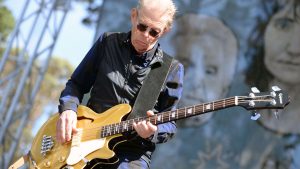 Hot Tuna will go on the road in a few days. What fans should expect from these shows?
Hot Tuna will go on the road in a few days. What fans should expect from these shows?
There is a whole catalogue. On Different tours, we pull out different songs. As a matter of fact, we got a few songs from our newer album, and a couple of songs from older albums that we haven’t done for a long time. So, while I’m here in Jersey, Channel Islands, I will go over the songs and then he (ed: Jorma Kaukonen, Hot Tuna and Jefferson Airplane lead guitarist) and I, will hook up on the West Coast in San Diego, to do the first show on February 13. We have been crawling a lot of different songs out, each time we go out on the road.
Are you looking forward to doing the Wheels of Soul Tour with Tedeschi Trucks Band and The Wood Brothers?
Absolutely! You know, they are a wonderful band and wonderful people and they have so many talented musicians with them. So, we look forward to that. We are going to do an electric Hot Tuna trio with Jorma, myself and Justin Guip on drums. We look forward to having a wonderful time. We are gonna be out the whole month of July and maybe there will be some shows added. We don’t know yet, but we are just starting to get that together.
What’s the difference between an electric and an acoustic Hot Tuna set?
Well, sometimes the material is slightly different. Of course, with the electric we get to do certain things with volume and amplifiers and play the songs that we intend to do with the electric guitar. Although, we still do a lot of the fingerpicking material that we do with the acoustic Hot Tuna. It’s always interesting to interpret it in electric format. In the acoustic format, it’s a lot more intimate with Jorma and myself only. This tour is coming up and so the audience will be drawn into your private world of playing.
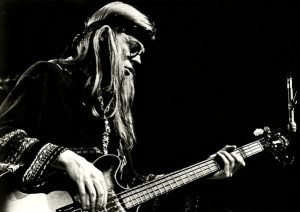 How important was Larry Campbell’s work as a producer on “Steady as She Goes” album?
How important was Larry Campbell’s work as a producer on “Steady as She Goes” album?
Yeah, he is great! Larry is such a talented man. He plays so many different instruments that he has a good first-hand knowledge of. I trust him as a producer because he knows where the musicians are coming from. There is always a nice and interesting atmosphere. At the same time, he always has great creative ideas to work with, so it’s an interesting collectivity.
What’s the secret of your lasting friendship and musical collaboration with Jorma Kaukonen?
Jorma always says: “The secret is that we have never had a band meeting” (laughs). We go back a long-long way. We go back to when we were children in Washington D.C and I think that laid the foundation of friendship and also of a reference point that is based on things you do in your career. I think it gives us a larger view of ourselves individually and collectively, so we know what each other does well and we respect each other. I think we both enjoy what we can get from each other in a positive way. It’s much more interesting to explore the friendship through music and through other interests we have.
This year there will be a new edition of the Epiphone Jack Casady Signature Bass. Can you give us some information about this?
It will come out in May and it looks just spectacular and you can play it even better. I’m really happy with it. I will be bringing that instrument out on this tour that I’m gonna do in February when we will play an electric show at the Fillmore Auditorium. We opened up the Fillmore Auditorium, with the very first concert with Bill Graham, many years ago.
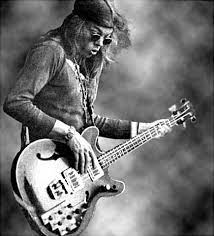 You are teaching bass at Jorma Kaukonen’s Fur Peace Ranch. What’s your philosophy on teaching?
You are teaching bass at Jorma Kaukonen’s Fur Peace Ranch. What’s your philosophy on teaching?
We will open up the new season for 2017, at the Fur Peace Ranch on March 17. I think it’s my job to take the student and see if I can find his weaknesses and build some strength in that. So, that he can leave that workshop afternoon with some new tools to apply to his own physical work. I teach through songs and I teach through all the songs that I played with Hot Tuna and Jefferson Airplane. But in the end of the day, the musicians that I teach aren’t going to be out just playing my music, they can be playing their own music or any music. I try to lay down a good foundation for their work on the bass guitar, but as well a good musical foundation.
How much has your playing style changed over the years?
That’s pretty interesting. As soon as we investigated our catalogue, and saw what we ‘ve done over the years, I realised how much work I did as a young man in the direction that I wanted to go with the instrument. I think over the years, you will find and extend your direction. You always try to find challenges in your way to re-interpret and interpret your musical direction. Hopefully, you try to get a deeper and broader understanding of the craftwork of being a musician first and a bass player second.
What memories do you have of Woodstock?
(Laughs) A lot of excitement, 300.000 people, not knowing what’s gonna happen next and sharing that environment not only with the bandmates on stage and the other musicians but with the whole audience. So, it was a terrific experience.
You played at 7 o’clock in the morning! It’s strange, isn’t it?
Well, it’s a bit strange to be playing with the sun coming up, but it was also a good sign because it rained most of the night, so we were happy to see the sun come out.
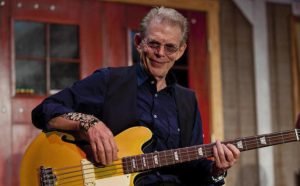 How did it happen to play on Jimi Hendrix’s “Voodoo Chile”?
How did it happen to play on Jimi Hendrix’s “Voodoo Chile”?
That happened because Jimi was working on his album in New York City at the time that the Jefferson Airplane were there. We were doing a TV show, called The Dick Cavett Show and after we had done that show early in the evening, we went over to see a band called Traffic that they were playing at a small club called Steve Paul’s The Scene. We went over to hear Traffic playing and Jimi came in. Jorma and I, knew Jimi from playing at the Fillmore and having a friendship there with Mitch Mitchell and him, back in San Francisco. So, Jimi invited us and when Traffic finished their set, Steve Winwood and those guys would come back to the studio. We watched Jimi recording for the rest of the night and early in the morning he said: “Let’s all play a blues”. So, the four of us: Mitch Mitchell, myself, Steve Winwood and Jimi Hendrix played “Voodoo Chile”.
A famous Greek composer, Manos Hadjidakis, stayed for some time at your house at 2400 Fulton Street. Do you remember him?
I’m trying to remember him right now, but what did he do?
He stayed there, he listened to other hippie things like The United States of America and offered Grace Slick to collaborate.
I remember the name, but I don’t remember the incident. You have to ask Grace about that.
Did you enjoy the 1968 European tour with The Doors?
Oh, absolutely! We got to play so many great places. You know, it was very exciting to leave the United States and come and see what is going on in the other countries in Europe. All those guys were great. I enjoyed The Doors. All the musicians were very talented and we all enjoyed each other’s company. We had such a good time.
Was it an interesting experience for you to watch Otis Redding performing at the Monterey Pop Festival (1967)?
Oh, yes! I have always been a big fan of Booket T. and the MG’s, since they recorded the song “Green Onions” (1962). They had backed so many musicians in Stax Records. But seeing Otis Redding with the Stax house band, I think that was absolutely the top.
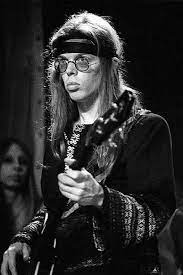 When you finished “Surrealistic Pillow” (1967), had you realised that you created one of the greatest albums of all time?
When you finished “Surrealistic Pillow” (1967), had you realised that you created one of the greatest albums of all time?
Not at the time (laughs). At the time, that album was basically a breakaway from recording a band live. The first album we did, “Jefferson Airplane Takes Off” (1966) it’s pretty much the way we played live, but in “Surrealistic Pillow” we were able to work on some of the songs in the studio and work within that atmosphere of the studio. So, that was really the beginning of making good studio records.
Was the 1968 Jefferson Airplane rooftop performance in New York copied by the Beatles for “Let It Be” in 1969?
I don’t know whether they copied, all I know is that we did it when we did it and they did it when they did it. To me is like saying that you copied somebody playing at a park. I mean, we played at the park and they played at the park because it’s a place to do it. It was great to do it in a financial district. Of course, it was in winter, it was very cold when we did it (laughs). But we should pick sunnier days to do that. We also recorded doing it with a movie filmmaker, Jean–Luc Godard.
Is it true that Jefferson Airplane wanted Frank Zappa to produce “Crown of Creation” (1968)? There is a photo of you with Frank Zappa on the Internet.
Oh, that’s great! Frank was such a talented guy and I loved the musicians in his band. I absolutely loved his approach to a lot of music that he did and he had such an acerbic wit that I think Spencer (ed: Dryden –drums), Grace and I, we were trying to get perhaps him to help us out with something, but I don’t think our schedules worked out.
Is it flattering that you influenced great bass players like Anthony Jackson (Al Di Meola, Paul Simon)?
Well, he’s such a man! Anthony is an incredible player. He has played with so many people who are wonderful. When I listen to his work it’s mind-boggling. So, when he gives me some credit for moving the bass forward a little bit in the world, I’m honoured that he would think so. He’s a good man.
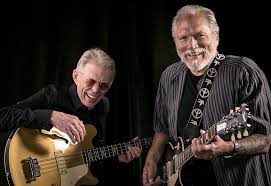 Do you believe that concerts are more important than studio albums?
Do you believe that concerts are more important than studio albums?
It’s just a different format. I don’t think it’s more important. I think playing live is always essential to any musician’s career because that’s where it all began. The album is a moment in time that is captured and you can do so many great things in the studio to create an atmosphere, like you do when you create a movie. But when you play live, I think that’s where you really are in the moment of music and you bring the audience into that particularly unique atmosphere at that night or that day. And I think that’s where it always lasts the test of time.
Are there any plans for a second solo album?
I’m here in Jersey, Channel Islands, I have a recording studio here and I have been working on a second Jack album. I’ve got some different people involved. I’ve doing a lot of it by myself, but I have Yair Dalal from Israel. He’s an oud player and a violinist and he’s on the album with me. I have Isaiah Gage who is doing some cello work for me. An electronic musician out of France called Daniel Masson, he has been working with me as well. I am looking forward to getting it out this year or at least post it on Youtube or on a site to get it on iTunes. So, we ‘ll see what happens.
Do you think social media like Youtube and Facebook have helped younger listeners to learn about your music?
I hope so. Also, it helps me to learn about other younger people’s music and find music in general. So, I think when it is used the right way, it’s an enormous tool for investigation.
Were you surprised when you saw a photo of Dave Grohl (Foo Fighters, Nirvana) playing an Epiphone Jack Casady Signature Bass?
There are a lot of people playing it now and I’m really happy with the success of it. It has been out for 20 years and I try to make and build the bass that engineers would love in the studio, but musicians would love to play.
You got to know Jerry Garcia (Grateful Dead) quite well. What was he like, on stage and off stage?
Jerry Garcia was such a talented man and such a good raconteur. He could entertain, overjoy and talk forever. He just had an interesting way of looking at life but most of all, he was a great musician. He loved to play and work with other musicians. He really enjoyed the music and it’s a shame that he left us so soon. I’d love to have him alive and playing right now today.
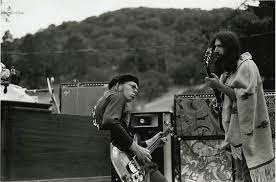 Is it a coincidence that all San Francisco bands had very strange names: Jefferson Airplane, Big Brother & the Holding Company, Quicksilver Messenger Service, Country Joe and the Fish?
Is it a coincidence that all San Francisco bands had very strange names: Jefferson Airplane, Big Brother & the Holding Company, Quicksilver Messenger Service, Country Joe and the Fish?
That’s why, yes… Hot Tuna! That’s the kind of what we did back then (laughs).
Do you enjoy playing heavier songs like “Song for the Fire Maiden”?
Yes, I enjoy all of it. They all have a different place. When I am playing, you know, in the electric format and I’m doing things with the songs a lot deeper and kind of more mystical, I really enjoy that genre for what it is. And then I equally enjoy a nice, quiet, acoustic bass and guitar format. So, each has different things.
A huge “THANK YOU” to Mr Jack Casady for his time and to Mrs Cash Edwards for her valuable help. I should also thank Mr John Hurlbut.
Jack Casady official website: http://www.jackcasady.com
Hot Tuna official website: http://hottuna.com
Fur Peace Ranch website: http://www.furpeaceranch.com

